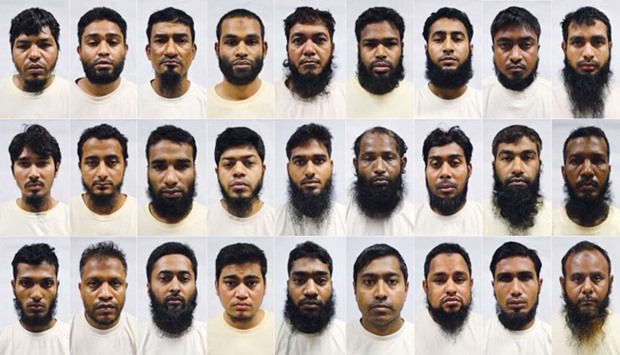Singapore disclosed yesterday it arrested 27 Bangladeshi construction workers late last year for supporting “the armed jihad ideology” of militants like the Islamic State group, and deported 26 of them.
The workers were being groomed to return to their home country to wage holy war and had studied booklets on assassination techniques, the Ministry of Home Affairs said in a
statement.
“They were plotting nefarious activities in Bangladesh and other countries, and not in Singapore. But they were still a serious threat to us,” Prime Minister Lee Hsien Loong said in a Facebook post late yesterday.
“We are tightening up our security, and acting to protect our racial and religious harmony. Radicalisation and terrorism must never take root in
Singapore.”
Home Affairs Minister K Shanmugam said in an earlier Facebook post that the workers “could have easily changed their minds and attacked
Singapore”.
Several members of the group also contemplated joining “armed jihad” with the IS group in Iraq and Syria, according to the MHA.
“They supported the armed jihad ideology of terrorist groups like Al Qaeda and the Islamic State in Iraq and Syria,” the
ministry said in the statement.
The 27 men, aged between 25 and 40, were arrested between November 16 and December 1 last year under Singapore’s
Internal Security Act.
The announcement came a week after an attack by suicide bombers and gunmen in the heart of Jakarta, the capital of neighbouring Indonesia, highlighting the growing threat Southeast Asia faces from
radicalised Muslims.
Maruf Hossain Sardar, a deputy commissioner of Bangladesh police, said 14 of the 26 had been jailed on “terror charges”.
“We have freed 12 others after interrogation, but we are monitoring their activities,” he said.
Some of the group members supported the violent actions of extremist groups that killed Shias because they considered Shias to be “deviant”, the
authorities said.
They all worked in construction in Singapore, where large numbers of labourers mostly from South Asia live in often cramped dormitories.
“The group members took measures to avoid detection by the authorities. They shared jihadi-related material discreetly among themselves, and held weekly meetings and gatherings where they discussed armed jihad and conflicts that involved Muslims,” the ministry said, adding that the group was also actively recruiting members.
Of the 27 Bangladeshis arrested, one was not deported and is serving a jail sentence for attempting to flee Singapore after learning about the
arrests of the group’s members.
He will be repatriated to Bangladesh after he completes his sentence. The man was said not to have been a member of the group but was “in the process of being radicalised”.
According to the ministry’s statement, the group’s members were encouraged to return to Bangladesh and “wage armed jihad” against the government there, while some had sent money to terror-linked entities in their country.
The ministry said they possessed radical and jihadi-related materials, including footage of children undergoing training in what appeared to be militant camps.
Excerpts from a video released by the ministry showed young boys dressed in black and wearing white caps firing pistols and automatic rifles during training.
There was also a document entitled “Techniques of Silent Killing” that contained graphic images and instructions on how to carry out assassinations, using different methods and weapon.
The announcement of the arrests came less than a week after militants mounted attacks in the Indonesian capital Jakarta, leaving at least eight people dead, including four suspected attackers.
The IS group claimed responsibility for the co-ordinated assault on a central thoroughfare in the capital.
Kumar Ramakrishna, a counter-terrorism analyst at Singapore’s S Rajaratnam School of International Studies, said the arrests would likely be “disconcerting” to the public as foreign workers have become part of Singapore’s social landscape.
“It drives home the point that terrorists can be amongst us and not far away,” he said.
Singaporean officials have said that the city-state remains a target by militants because of the presence of a large number of multinational corporations and its status as a regional financial centre.
Authorities in late 2001 foiled an attempt to carry out bomb attacks on US and other foreign targets in the city-state, arresting several suspects in the
process.

The 27 Bangladeshi nationals arrested in Singapore under the Internal Security Act.
